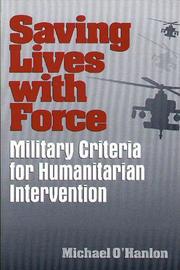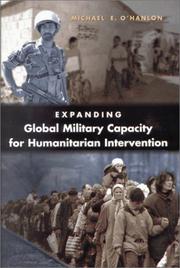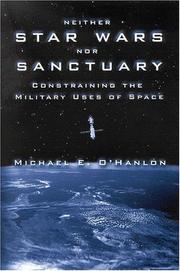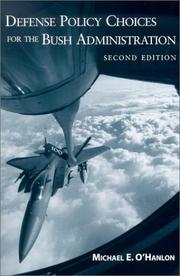| Listing 1 - 10 of 65 | << page >> |
Sort by
|

ISBN: 0815764472 Year: 1997 Volume: *1 Publisher: Washington (D.C.) : Brookings institution,
Abstract | Keywords | Export | Availability | Bookmark
 Loading...
Loading...Choose an application
- Reference Manager
- EndNote
- RefWorks (Direct export to RefWorks)
Polemology --- United Nations --- Aide humanitaire américaine --- American humanitarian assistance --- Amerikaanse humanitaire hulpverlening --- Humanitaire hulpverlening [Amerikaanse ] --- Humanitarian assistance [American ] --- Interventie (Internationaal recht) --- Interventie [Militaire ] --- Intervention (Droit international) --- Intervention (International law) --- Intervention [Military ] --- Intervention militaire --- Militaire interventie --- Military intervention --- Humanitarian assistance, American. --- Intervention (International law). --- Armed Forces
Book
ISBN: 9780815705079 Year: 2010 Publisher: Washington, D.C. : Brookings Institution Press,
Abstract | Keywords | Export | Availability | Bookmark
 Loading...
Loading...Choose an application
- Reference Manager
- EndNote
- RefWorks (Direct export to RefWorks)
"An endorsement for nuclear disarmament, especially the dismantling of existing bomb inventories, but with caveats relating to threats posed by nations or groups inside the agreement framework who do not abide by it and those outside who have never allied themselves with those advocating a nuclear-free world"--Provided by publisher.
Book
ISBN: 9780815726890 9780815727422 Year: 2015 Publisher: Washington, D.C. Brookings Institution Press
Abstract | Keywords | Export | Availability | Bookmark
 Loading...
Loading...Choose an application
- Reference Manager
- EndNote
- RefWorks (Direct export to RefWorks)
The author begins with a historical sketch of the role of ground forces in the American way of war throughout US history. He surveys the world's key strategic regions for their importance to American national security and their vulnerability to large-scale violence. He then considers a number of illustrative scenarios in which large American conventional forces may be relevant. Where are large-scale conflicts or other catastrophes most likely to happen ? Which of these could be important enough to demand a US military response ? And which, in turn, might require significant numbers of American ground forces ? And finally, what do these considerations say about the proper size, structure, and capabilities of the future US Marine Corps and Army ?
Polemology --- United States --- PolemologyUnited States --- United States of America

ISBN: 0815764421 0815764413 Year: 2003 Publisher: Washington, D.C. Brookings Institution
Abstract | Keywords | Export | Availability | Bookmark
 Loading...
Loading...Choose an application
- Reference Manager
- EndNote
- RefWorks (Direct export to RefWorks)
International movements --- 856.4 Conflictresolutie --- 822 Internationale organisaties --- 241 Hedendaagse wereldproblemen --- 255 Internationale organisaties --- POLITICAL SCIENCE --- History & Theory --- Humanitarian intervention --- Peacekeeping forces --- Peacekeeping (Military science) --- Peacekeeping operations --- Armed Forces --- International police --- Peace-building --- Intervention (International law)

ISBN: 0815764561 081576457X Year: 2004 Publisher: Washington, D.C. Brookings Institution Press
Abstract | Keywords | Export | Availability | Bookmark
 Loading...
Loading...Choose an application
- Reference Manager
- EndNote
- RefWorks (Direct export to RefWorks)
Space has been militarized for over four decades. Should it now be weaponized? This incisive and insightful book argues that it should not. Since the cold war, space has come to harbor many tools of the tactical warfighter. Satellites have long been used to provide strategic communication, early warning of missile launch, and arms control verification. The U.S. armed forces increasingly use space assets to locate and strike targets on the battlefield. To date, though, no country deploys destructive weapons in space, for use against space or Earth targets, and no country possesses ground-based
Polemology --- United States --- Astronautics, Military -- United States. --- Ballistic missile defenses -- United States. --- Space warfare. --- United States -- Military policy. --- World politics -- 21st century. --- Air Forces --- Military & Naval Science --- Law, Politics & Government --- United States of America

ISBN: 0815764677 Year: 2005 Publisher: Washington, D.C. Brookings Institution
Abstract | Keywords | Export | Availability | Bookmark
 Loading...
Loading...Choose an application
- Reference Manager
- EndNote
- RefWorks (Direct export to RefWorks)
Polemology --- anno 2000-2009 --- Iraq --- United States --- Afghanistan --- Polemologyanno 2000-2009Iraq --- United States of America

ISBN: 0815764375 Year: 2002 Publisher: Washington : Brookings Institution Press,
Abstract | Keywords | Export | Availability | Bookmark
 Loading...
Loading...Choose an application
- Reference Manager
- EndNote
- RefWorks (Direct export to RefWorks)
USA--MILITARY POLICY --- USA--ARMED FORCES --- USA--ARMED FORCES--DEFENSE SPENDING
Book
ISBN: 9780815731313 9780815731320 0815731329 Year: 2017 Publisher: Washington, D.C.
Abstract | Keywords | Export | Availability | Bookmark
 Loading...
Loading...Choose an application
- Reference Manager
- EndNote
- RefWorks (Direct export to RefWorks)
Internal politics --- Social stratification --- International relations. Foreign policy --- Public administration --- Social policy --- United States --- Economic policy and planning (general) --- Presidents --- Election --- 2016 --- Politics and government --- 21st century --- Economic policy --- Foreign relations --- United States of America
ISBN: 9780815732570 9780815732587 Year: 2017 Publisher: Washington, D.C. Brookings Institution Press
Abstract | Keywords | Export | Availability | Bookmark
 Loading...
Loading...Choose an application
- Reference Manager
- EndNote
- RefWorks (Direct export to RefWorks)
The author argues here that now is the time for Western nations to negotiate a new security architecture for neutral countries in eastern Europe to stabilize the region and reduce the risks of war with Russia. He believes NATO expansion has gone far enough. The core concept of this new security architecture would be one of permanent neutrality. The countries in question collectively make a broken-up arc, from Europe's far north to its south : Finland and Sweden; Ukraine, Moldova, and Belarus; Georgia, Armenia, and Azerbaijan; and finally Cyprus plus Serbia, as well as possibly several other Balkan states. Discussion on the new framework should begin within NATO, followed by deliberation with the neutral countries themselves, and then formal negotiations with Russia. The new security architecture would require that Russia, like NATO, commit to help uphold the security of Ukraine, Georgia, Moldova, and other states in the region. Russia would have to withdraw its troops from those countries in a verifiable manner; after that, corresponding sanctions on Russia would be lifted. The neutral countries would retain their rights to participate in multilateral security operations on a scale comparable to what has been the case in the past, including even those operations that might be led by NATO. They could think of and describe themselves as Western states (or anything else, for that matter). If the European Union and they so wished in the future, they could join the EU. They would have complete sovereignty and self-determination in every sense of the word. But NATO would decide not to invite them into the alliance as members. Ideally, these nations would endorse and promote this concept themselves as a more practical way to ensure their security than the current situation or any other plausible alternative.
Polemology --- NATO --- Eastern and Central Europe
Book
ISBN: 0815732589 0815732570 Year: 2017 Publisher: Baltimore, Maryland : Project Muse,
Abstract | Keywords | Export | Availability | Bookmark
 Loading...
Loading...Choose an application
- Reference Manager
- EndNote
- RefWorks (Direct export to RefWorks)
In this new Brookings Marshall Paper, Michael O'Hanlon argues that now is the time for Western nations to negotiate a new security architecture for neutral countries in eastern Europe to stabilize the region and reduce the risks of war with Russia. He believes NATO expansion has gone far enough. The core concept of this new security architecture would be one of permanent neutrality. The countries in question collectively make a broken-up arc, from Europe's far north to its south: Finland and Sweden; Ukraine, Moldova, and Belarus; Georgia, Armenia, and Azerbaijan; and finally Cyprus plus Serbia, as well as possibly several other Balkan states. Discussion on the new framework should begin within NATO, followed by deliberation with the neutral countries themselves, and then formal negotiations with Russia. The new security architecture would require that Russia, like NATO, commit to help uphold the security of Ukraine, Georgia, Moldova, and other states in the region. Russia would have to withdraw its troops from those countries in a verifiable manner; after that, corresponding sanctions on Russia would be lifted. The neutral countries would retain their rights to participate in multilateral security operations on a scale comparable to what has been the case in the past, including even those operations that might be led by NATO. They could think of and describe themselves as Western states (or anything else, for that matter). If the European Union and they so wished in the future, they could join the EU. They would have complete sovereignty and self-determination in every sense of the word. But NATO would decide not to invite them into the alliance as members. Ideally, these nations would endorse and promote this concept themselves as a more practical way to ensure their security than the current situation or any other plausible alternative.
National security --- North Atlantic Treaty Organization. --- North Atlantic treaty organisation --- North Atlantic Treaty Organization --- NAVO --- OTAN --- Buffer states --- Europe, Eastern --- Russia (Federation) --- Foreign relations --- Buffer nations --- Buffer zones --- States, Buffer --- Geopolitics --- Neutrality --- Russian Federation --- Rossiyskaya Federatsiya --- Rossiya (Federation) --- Rossii︠a︡ (Federation) --- Российская Федерация --- Rossiĭskai︠a︡ Federat︠s︡ii︠a︡ --- Rosiĭsʹka Federat︠s︡ii︠a︡ --- Російська Федерація --- Federazione della Russia --- Russische Föderation --- RF --- Federation of Russia --- Urysye Federat︠s︡ie --- Pravitelʹstvo Rossii --- Правительство России --- Pravitelʹstvo Rossiĭskoĭ Federat︠s︡ii --- Правительство Российской Федерации --- Правительство РФ --- Pravitelʹstvo RF --- Rosja (Federation) --- Eluosi (Federation) --- O-lo-ssu (Federation) --- 俄罗斯 (Federation) --- Roshia Renpō --- Federazione russa --- OKhU --- Orosyn Kholboony Uls --- Russian S.F.S.R. --- East Europe --- Eastern Europe --- RF (Russian Federation) --- Россия (Federation)
| Listing 1 - 10 of 65 | << page >> |
Sort by
|

 Search
Search Feedback
Feedback About
About Help
Help News
News